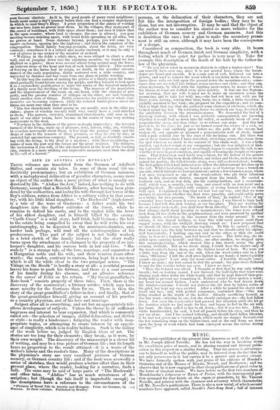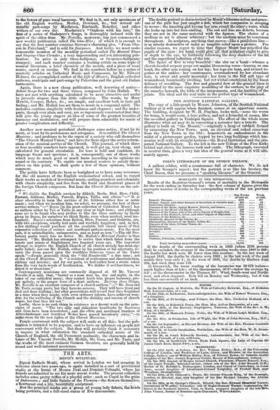No music - publisher at the present time deserves so well of
the *die au Mr. Joseph Alfred Novelle. He has led the way in breaking down the exorbitant price of music, and in placing musical and literary publi-. cation in this respect on a similar footing. That his system is advantage- ous to himself as well as the public, may be inferred from the fact that he not only perseveres in it but carries it to a greater and greater extent. We have formerly spoken with just praise of his editions of Handers Oratorios and of the Masses of Haydn, Mozart, and Beethoven; and we observe that he is now engaged in other cheap publications of groat value to the lover of classical music. We have before us the first two numbers Of Mendelmohn's lobgesmag or Hymn of Praise, with the instrumental por- tion arranged" for four hands on the organ or pianoforte, by Mr. Vincent Novell), and printed with the clearness and accuracy which characterize all Mr. Novelle's publications. There is also a new serialof which severer numbers have appeared, called Novello's Part-13ow Beak full of interest.
, .• • .
to the lovers of pure -vocal harmony. We find in it, not only specimens of the old English worthies, Morley, Dowland, &c., but several ad-: mit! tble - part-songs by Moefarren, Binibault, Benedict, and other writers of our own• day. Macfarren's "Orpheus 'with his lute," the first of a series of Shakspere's Songs, is thoroughly imbued with the spirit of the olden tint& rfavl•Tovello moreover, hi* just commenced a new weekly publication !called- Vie acte-Mii,e ; of which it is enough to say that the first number contains Stevens's 'charming glee, "From Obe- ron in, Fairyland," and is sold. tOr foUrpence. And lastly, we must make honourable mention of the Monthly periodical called Thttilitsisai Tittles and Singing-Class Circular • a very unpretending and yet iiiterestingptib- lication.- Its price - is only three-halfpence or twopence-halfpemiy stamped ; and each number contains a leading article on some topic of musical literature, a brief chronicle of the month, and a piece of vocal music; sacred or secular. We find in the nunibers before us a series of masterly articles on Cathedral Music and-Composers, by Mr. Edward Holmes, the accomplished author of the Life of Mozart; English cathedral anthems, madrigals and part-songs by Palestina and the great old Italian harmonists.
Again, there is a new cheap publication, well deserving of notice— School Songs for two and three 'voices, composed by John Mullah. We have not met with anything calculated to be more attractive and useful to juvenile singers than this little collection. : The words, by Mary Hewitt, Cowper, Heber, &e., are simple, and excellent both in taste and feeling ; and Mr. Mullah has set them to music in a congenial spirit. The melodies combine simplicity with freshness and elegance ; and the under- parts, though very plain and easy, are so ingeniously constructed that they will give the young singers an. idea of sOme of the greatest beauties, of harmony and modulation and will prepare them admirably for music of greater complication and .iliffieulty..-



























 Previous page
Previous page